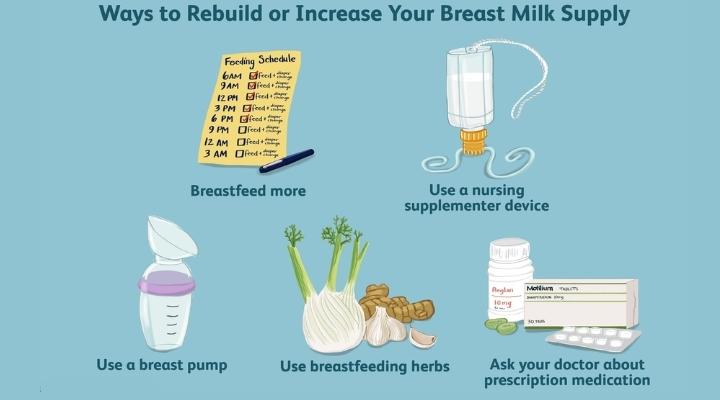5 Effective Ways to Increase Breast Milk Supply
Breastfeeding is a natural and beautiful way to nourish your baby, providing them with essential nutrients and a strong foundation for growth and development. In this article, we will explore 5 Effective Ways to Increase Breast Milk Supply and ensure your baby gets the nourishment they need. However, many new mothers may experience challenges when it comes to producing an adequate supply of breast milk. Low milk supply can be a source of stress and worry for mothers, but several effective strategies can help increase breast milk production.
5 Effective Ways to Increase Breast Milk Supply
1. Frequent and Effective Nursing-
One of the most fundamental ways to increase breast milk supply is by nursing your baby frequently and ensuring a proper latch. The principle of supply and demand plays a crucial role in milk production. The more your baby nurses, the more signals your body receives to produce milk. Newborns have smaller stomachs and require more frequent feedings, so it’s essential to feed your baby whenever they show hunger cues.
Moreover, establishing a proper latch is paramount. An improper latch can lead to ineffective milk transfer, which may result in decreased milk production. To ensure a good latch, make sure your baby’s mouth covers a significant portion of the areola, not just the nipple. This will encourage efficient milk extraction and stimulate milk production.
2. Proper Hydration and Nutrition-
Staying well-hydrated and maintaining a balanced diet rich in nutrients can significantly impact breast milk supply. Dehydration can hinder milk production, so make a conscious effort to drink plenty of water throughout the day. Additionally, consuming a variety of nutritious foods provides your body with the energy and resources it needs to produce milk.
Certain foods are believed to have lactogenic properties, meaning they can help increase milk supply. Examples include oatmeal, fenugreek, fennel, and brewer’s yeast. However, it’s important to consult with a healthcare professional before making significant changes to your diet or taking supplements, especially if you have any underlying health conditions.
Related- 5 Reasons – Why You Should Not Drink Coffee (Caffeine) During Pregnancy?
3. Skin-to-Skin Contact and Kangaroo Care-
Skin-to-skin contact, also known as kangaroo care, offers numerous benefits for both mothers and babies, including enhancing breast milk supply. This practice involves placing your baby on your chest, skin-to-skin, which helps regulate their body temperature, heart rate, and breathing. Additionally, skin-to-skin contact stimulates the release of oxytocin, the hormone responsible for milk ejection.
Kangaroo care can be especially beneficial during the early postpartum days when establishing a robust milk supply is crucial. Spending quality time skin-to-skin with your baby promotes milk production and strengthens the emotional bond between you and your little one.
4. Pumping and Breast Compression-
In cases where direct nursing is not possible, pumping breast milk can help maintain and even increase milk supply. Breast pumps mimic the sucking action of a baby, stimulating the breast to produce more milk. Incorporating regular pumping sessions, especially after nursing or between feedings, can signal your body to produce additional milk.
Breast compression is another technique that can help maximize milk extraction during nursing or pumping. Gently compressing the breast while your baby is latched or during pumping can encourage the flow of milk and effectively empty the breast. This increased breast drainage sends signals to your body that more milk is needed, thus boosting supply over time.
Also check- Why Only a Few Women Experience Nosebleeds During Pregnancy?
5. Manage Stress and Rest-
Stress can have a significant impact on breast milk supply. High-stress levels can interfere with the hormones involved in milk production, potentially leading to a decreased supply. Finding ways to manage stress is essential for maintaining optimal milk production.
Engaging in relaxation techniques such as deep breathing, meditation, and gentle exercises like yoga can help alleviate stress. Additionally, ensuring you get enough rest is crucial. Sleep deprivation can affect hormone regulation and overall well-being, potentially influencing milk supply. While it’s challenging to get uninterrupted sleep with a newborn, try to nap when your baby sleeps and seek support from your partner, family, or friends to allow you some rest.
Increasing breast milk supply is a common concern for many new mothers, but it’s important to remember that every woman’s body is unique. Implementing these five effective strategies—frequent nursing, proper hydration and nutrition, skin-to-skin contact, pumping, and stress management—can collectively contribute to boosting your milk production. Remember that patience is key, as it may take time for your body to respond to these methods. If you continue to experience challenges with milk supply, consider seeking guidance from a lactation consultant or healthcare provider who can provide personalized advice and support. The journey of breastfeeding is about nourishing your baby and nurturing the special bond between mother and child.
Frequently Asked Questions-
What are the best foods to increase breast milk supply?
Many mothers are curious about the foods they can consume to boost their milk production. They want to know which specific foods, such as oatmeal, fenugreek, and fennel, are most effective at increasing their breast milk supply. Additionally, they may inquire about dietary changes and supplements that can support their lactation journey.
How often should I nurse or pump to increase my milk supply?
New mothers often wonder about the frequency of nursing or pumping sessions required to enhance their milk supply. They might ask about a recommended schedule for breastfeeding and pumping, as well as whether there’s an optimal time of day for pumping. This question reflects their desire to establish a routine that optimally supports their milk production.
Can stress affect my breast milk supply?
Many women are concerned about the impact of stress on their milk supply. They may question whether stress can truly hinder their ability to produce enough milk for their baby. This question often arises from the desire to understand the connection between emotional well-being and breastfeeding success, as well as how to effectively manage stress to ensure optimal milk production.
What is the role of skin-to-skin contact in increasing breast milk supply?
Skin-to-skin contact, also known as kangaroo care, is a concept that raises questions among new mothers. They might want to know how exactly this practice stimulates milk production and how frequently they should engage in it. Understanding the scientific basis behind skin-to-skin contact and its influence on hormone release and milk ejection is important to these mothers.
Are there any medications or herbs that can help increase breast milk supply?
Some mothers might inquire about the safety and effectiveness of various medications, herbal supplements, and lactation teas that claim to enhance milk production. They may ask about fenugreek, blessed thistle, other commonly recommended herbs, and any potential side effects or interactions. This question reflects their interest in exploring different options to support their breastfeeding journey.










